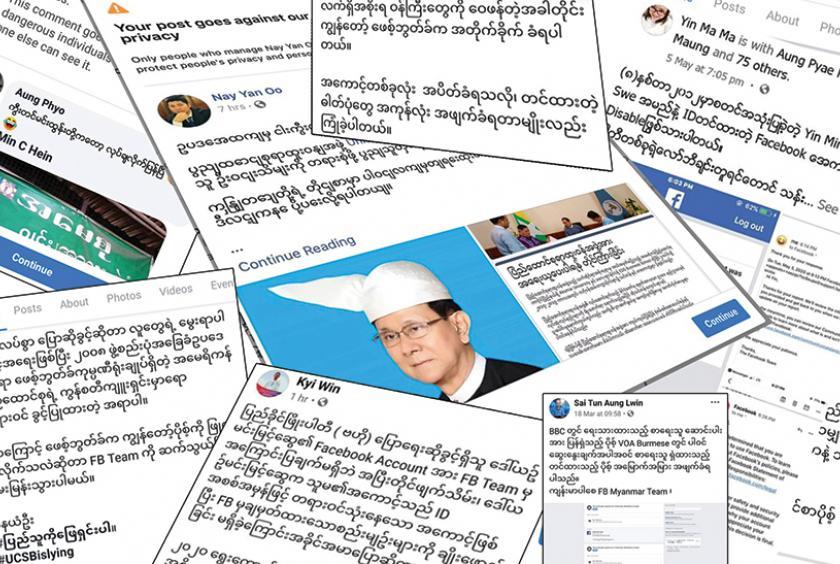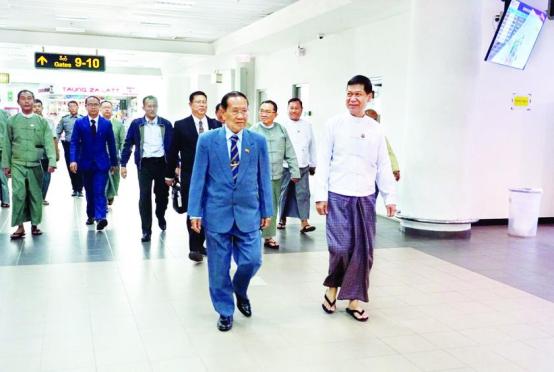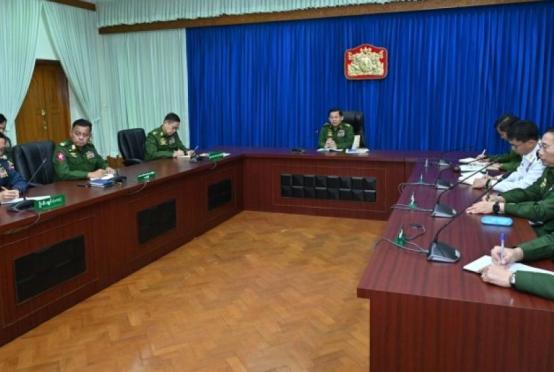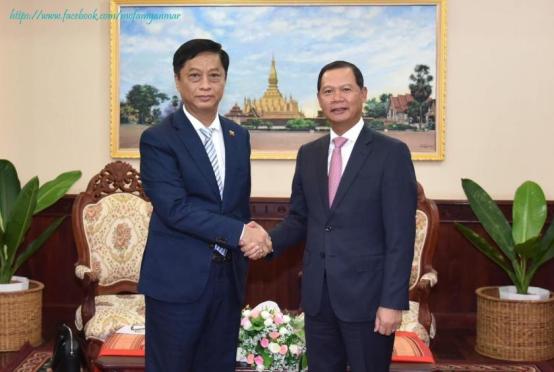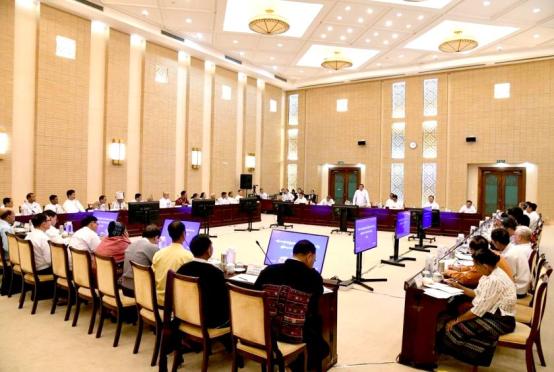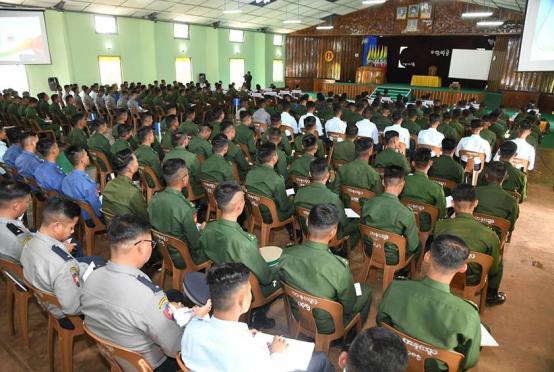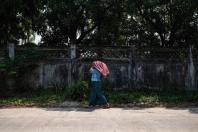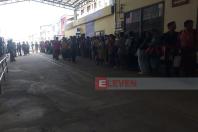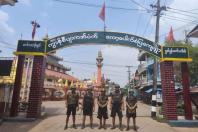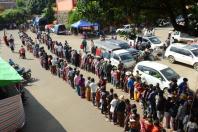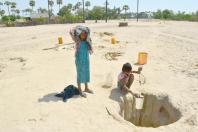(1)
In the current era of the National League of Democracy (NLD) led civilian administration, voted for by the people, Facebook accounts belonging to critics of the government are being shut down. This did not occur during the previous administration under U Thein Sein, a government labeled by many as partially led by the military.
It begs the question of Facebook’s stance in Myanmar. While Facebook users critical of the government find their accounts getting shut down, pro-NLD lobby accounts have received Facebook’s official Blue Mark recognition despite repeated obscenities and derogatory comments against leaders of the opposition parties, ex-government staff, and persons that do not agree with the NLD. Is Facebook quelling criticism by disabling the accounts of dissenters as per the government mandate? Or does Facebook have a special policy just for Myanmar? There is a need now to consider how Facebook can affect the fairness of the upcoming election.
One such account belongs to Daw Yin Min Myint Swe, spokesperson of the major opposition, the Union Solidarity and Development Party (USDP).
She said, “My account, registered under the name Yin Min Myint Swe and was used for eight years since 2012, was disabled. As of now, even comparing Facebook accounts between lobbies for different parties, accounts siding with opposition parties are being removed thanks to the power of over 6 billion pro-government lobbies. When I reported this to Facebook and received the reply, I can assume that it was ordered by the government.” She says she will continue to be a staunch critic of the government.
What's more worrisome is that another user by the name of Kyi Win also had his account banned for sharing a post regarding the closure of Daw Yin Min Myint Swe’s account on May 5. Kyi Win posted on his account that the Myanmar government’s 6 billion kyat-social media regulatory body through its cooperation with Facebook team backs lobbyist accounts through the provision of blue marks while critics such as Daw Yin Min Myint Swe, that had not broken any of Facebook’s rules, have received bans. The post by Kyi Win was later deleted by Facebook and he was subsequently banned from posting updates for a time despite the lack of any foul play. If that is Facebook’s policy regarding Myanmar, then it has exacerbated Myanmar’s already unfair democracy and bottom-scraping freedom of speech levels.
Naturally, questions have been asked to the top policy makers regarding whether the government is ordering the termination of Facebook accounts that dissent the current administration on Facebook? The Daily Eleven contacted U Zaw Htay, spokesperson of the President’s Office, regarding this matter to which he replied that “there is no order. We also don’t have the power to order them.”
Is Facebook’s closure of not only voices of dissent but also of journalists a sign that the US-backed Facebook will be meddling in Myanmar’s elections? Are there any deals made between Facebook and the current government to carry out actions that are against global norms? Is it being done by the Social Media Monitoring Team (SMMT) that cost the government over 6.4 billion Kyats? Is the Union Election Commission (UEC) involved?
Is the Facebook Myanmar team to blame because they are deleting posts without any hate speech or obscenities despite not detected by the Facebook AI? If so, there is now a need to check under whose directives are the Facebook Myanmar Team and Facebook Checker Team operating to censor the opposition while uplifting pro-government supporters through blue mark badges. The media and the opposition must keep coming up with questions in order to enforce a fair game so that the 2020 election will be free and fair while also protecting the essence of democracy that is freedom of speech.
(2) Facebook’s practices in Myanmar are unfair due to the fact that, comparing against everywhere else in the world, Facebook is allowing events that restrict criticism toward the current government as well as ignoring requests to take down many instances of derogation of Buddhism. While the removal and ban of accounts that are crude and prone to profanities are understandable, pages and accounts that routinely break their own Community standards are being protected while civilized posts against the current administration are getting cracked down upon. It also beckons another thought: why is Facebook being allowed to operate in the country without paying any taxes at all?
Right now, the government could earn from Facebook around a maximum of a hundred million dollars per annum and that is being left alone. The formation of Ks 6.4 billion Social Media Monitoring Team (SMMT), as well as the removal of opposition voices as well as cooperation between the UEC and Facebook to remove any unsavoury elements that may harm the election also, brings about another thought: how much power was given to the UEC (Union Election Committee)?
“A supervisory group will be formed to monitor things being said on Facebook. Words that may bring harm to the election and breed hate will be removed. It has been discussed with authorities from Facebook. They will remove such elements if they notice or if we reported to them,” said UEC member U Myint Naing on February 6 at a press meet at the UEC office.
If we were to go back to the ban of opposition party’s Daw Yin Min Myint Swe, she posted neither swear words nor hate speech but yet still had her account removed, which brings forth the question of whether this is due to the agreement between the UEC and Facebook.
Facebook cannot simply delete accounts on a whim at the behest of the government as Myanmar citizens are protected by personal freedom and security laws. This is a law that allows for a lawsuit against the government itself and whether or not the current administration had requested so, Facebook has been breaking extant laws while also being an organization that does not pay taxes and is causing the leakage of foreign currency. Are the accounts of citizens being tracked? Are Facebook Messenger conversations being spied upon? Did the government have a deal with Facebook to do so?
Furthermore, Facebook released a statement regarding the removal of 18 ‘fake accounts’ related to the police force as well as 3 media organization imposters on May 5. Every time there comes an announcement by Facebook of such removals, it concentrates mainly on accounts related to either the police or the military. If true, then is Facebook treating the police force and military as its enemies? The propaganda wheel does not only spin for the police and the military to attack the AA insurgents. While other ‘fake’ misinformation still continue to thrive, reports to Facebook to safeguard their own standards by removing defamation against Buddhism go unheeded and unhindered. Does Facebook understand its psychological harm towards devout Buddhists?
(3)
Eleven Media Group have consistently sent questions to Facebook regarding bias and unfair practices in Myanmar but always only received evasive replies and answers. For example, Facebook was questioned on the nonexistence of taxes of around 100 million dollars per year to be paid to the state, assuming that calculations Facebook earns around 300 to 500 million dollars per year were true. Facebook replied that it was not their policy to publish their income and other numbers by each country.
Facebook also had a track record of blind guessing that a post or a comment was being critical of the government or certain individuals in government. For instance, a Facebook user named Aung Phyo had commented on a picture of a market stall that contained the words “Amay Su” (the popular moniker meaning ‘Mother Suu’ for the State Counselor) while tagging his friend. He was banned from both Facebook and Messenger for a month for breach of Community Standards.
The values of democracy have, in that case, been clearly been invaded upon while in comparison, Americans mock, physically abuse statutes and satirical caricatures of the current president Donald Trump. Facebook was questioned regarding such local cases but replied only that they did not have data on those cases.
Another example of what can only be described as Professional Negligence by Facebook concerns the ex-MP Ye Tun. He shared an article on Facebook, written and published by the VOA media organization that had the title “Why NLD’s constitutional amendment plan did not work”. The post was blocked by Facebook as it went against Facebook’s Community Standards. U Ye Tun retaliated that he was not pleased with which after Facebook apologized and reinstated his post. Journalist Sai Tun Aung Lwin, known for his pieces regarding ethnic minorities, shared his article that was featured on BBC to which Facebook deemed it in breach
of Community Standards and blocked it. These are signs that Facebook is becoming akin to the infamous, draconian censorship regime that is the Press Scrutiny and Registration Board during the reign of the military government. If any and all seeming slights against the government were to be censored and acted upon, it not only showcases Professional Negligence by Facebook but its likeness to the brutal “Literary Gestapo” of Myanmar’s past.
Yet another damning evidence of Facebook’s bias concern a Facebook user Nay Yan Oo had his post concerning legal action against union ministers removed by Facebook. Not only was Nay Yan Oo a “real” account, he was a candidate for a Master of Public Policy. He regularly points out and discusses the flaws of the government but on March 2, he posted that every time he posted - he would suffer repercussions from Facebook by a temporary ban of his account or removal of pictures.
Eleven Media Group had also questioned Nay Yan Oo’s case, amongst others, on the professional negligence, bias toward the NLD and breach of global standards. A spokesperson from Facebook only said that they are trying to make the election fair and nothing much else.
Facebook, as an international entity, must investigate those responsible for such biased actions within the Myanmar Facebook Team that are manipulative of Myanmar’s populace that had entirely almost taken up using Facebook. Facebook must find out who amongst their Myanmar team have become political tools to bring forth such criticisms of their vaunted Community Standards from a conflict-filled nation that is Myanmar.
“Facebook’s double-standard policies in Myanmar, a small and conflict-ridden country, have a lot to answer for. It’s unacceptable. Their controversial actions breed doubt that the 2020 election will be free and fair. It will show that there is definitely partiality when it comes to the ruling party, opposition parties and others. It is unacceptable if they are interfering in politics. Facebook needs to check its own global policies and act accordingly in Myanmar as well. Whether or not they take the side of the ruling party or opposition, it is a danger to democracy. Myanmar’s Facebook users will not accept this. Facebook cannot simply take down accounts that criticize the government without good reasons. If Facebook claims that they do no such things all across the world, they should investigate why this is happening so in Myanmar. Why is this happening? Who is responsible? If Facebook finds that people from the Facebook Myanmar Team are responsible, they have to take action. There already are laws enacted in Myanmar regarding social media platforms so anything on Facebook can be decided in accordance with those laws. There are many cases that are indeed in conflict with Facebook’s Community Standards and action against such cases are fine but not just simply for criticism against the government. If they do so, they are infringing on freedom of speech and Facebook must be aware,” said Ko Kyaw Zaw Linn, Chief Editor of The Daily Eleven Newspaper, when asked to comment on the differences in actions by Facebook between Myanmar and the rest of the world, including the US - home of Facebook.
Journalists had high hopes that media freedom would improve under the NLD but their hopes since then have been dashed as media freedom falls for three years straight. A survey conducted by Free Expression Myanmar (FEM) on Myanmar’s press freedom shows that it is very low. Athan group also reported that under the NLD, not only press freedom but all civil rights to free speech is on the decline; as proven by at least 1051 people facing trial under laws that seek to impede individual right to free speech. Facebook is reinforcing that very negative spiral further because many of the hundreds of cases concern criticism of the military, PMs and other government staff on Facebook. The FEM survey of 220 journalists resulted in many believing that digital media freedom is on the decline and that a third of news reporters as well as half of the editors experienced Facebook warning messages about Community Standards while doing their journalistic duties. Half of the reporters say their posts have been taken down by Facebook before and that male journalists are more prone to action by Facebook compared to females.
Many now are starting to warm to the idea that Facebook is also targeting journalists that, by nature of their job, involve criticizing the government on top of silencing opposition.
“The first thing is that I shared a news article that I discussed with VOA, which also contains information regarding COVID-19, specifically about fast-spreading rumours that may do harm if the government fails to counteract it quickly. That got removed. And then the BBC article and that slightly involved the government. Both of those got taken down in the same day so I initially thought it might be an error but it was not because similar cases had happened before last year. It is suspicious. It is not like we are writing anything offensive for the Facebook Myanmar Team to flag it as breaching Community Standards. We point out the weak points in government policies as it is our duties as journalists. Facebook is leaning. It has to be neutral instead of getting into cahoots with those in power because when it comes to Myanmar, it has to do a lot of answering in the international scene. Why don’t they pay closer attention to what the politicians and journalists are saying better? When it comes to the election, even just as a Facebook user, we feel that it leans toward a certain side even if it wasn’t true,” said Sai Tun Aung Lwin, an ethnic minority journalist.
Since it seems to give off an image that Facebook is collaborating with the government, it also falls on all political parties to question Facebook in order to make the 2020 election free and fair.
“Before even getting to a free and fair election, our Facebook accounts are getting deleted so freedom of speech has been impeded. The military’s chief, Myawaddy, Ngwe Tar Yi Magazine - all those pages got deleted. My account got deleted. USDP’s spokesperson Daw Yin Min Myint Swe account was deleted. We also always feel that every time we issue a statement or announcement, Facebook has tempered and lowered the reach of it. If we previously boosted (paid) five dollars, we can reach around 30,000 but right now it's not even 10,000; close to only 5000. Our reach has been lowered. In this way, it provides an unfair edge for the election because most people are only going to see their words and not ours,” said Aung Pyae Phyo Maung, Secretary of Yangon Region’s National Democratic Force.
The FEM’s survey also suggested that parties must make dedicated promises to defend press freedom. Only through that and the follow-up to ensure that entities such as Facebook do not get involved in the 2020 election is the only way to stop global powers such as the US from manipulating and getting involved in the 2020 Myanmar election.
If there is no control over the concerted efforts between the government, the UEC, and Facebook, the upcoming 2020 election will not be free and certainly not be fair.

